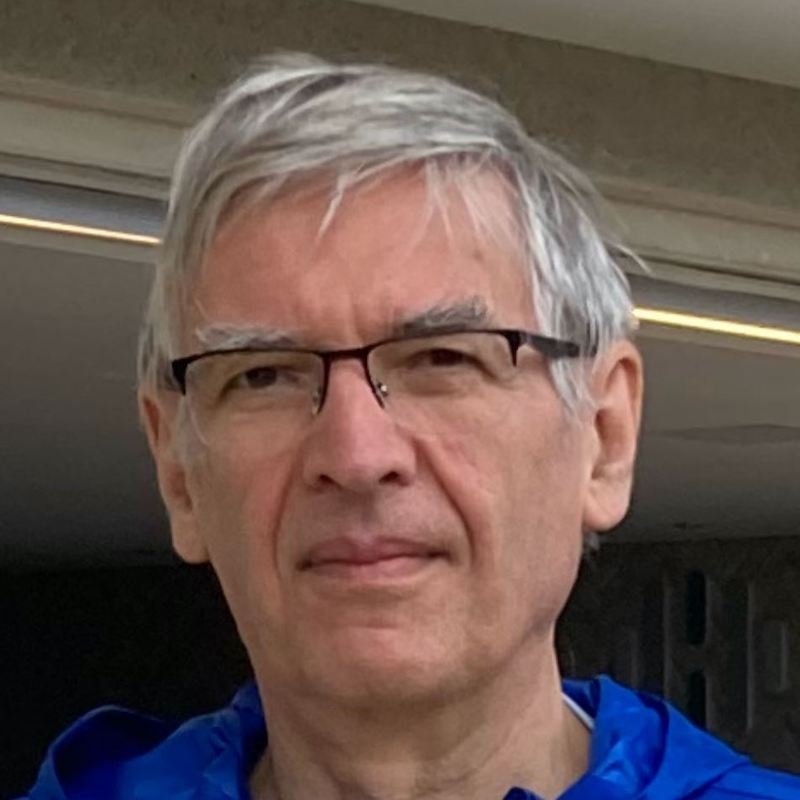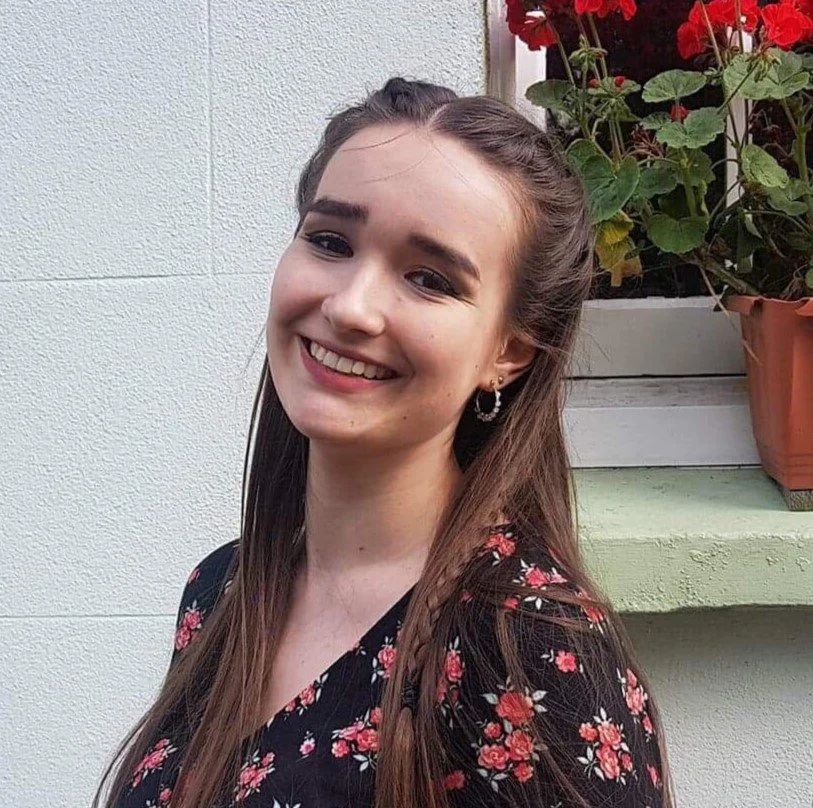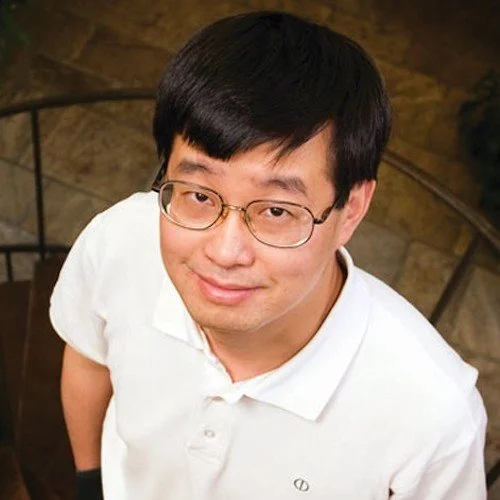Personnel
Project Leadership
Christopher A. Fuchs is a Professor of Physics at the University of Massachusetts Boston who specializes in quantum information theory and quantum foundations. Previously, he held senior research positions at BBN Technologies, Perimeter Institute for Theoretical Physics, and Bell Labs. From 1996-1999 he was the Lee A. DuBridge Prize Postdoctoral Fellow at the California Institute of Technology. He is an author or co-author of over 160 publications, with over 18,000 citations on Google Scholar. One co-authored paper with H. J. Kimble’s experimental group, “Unconditional Quantum Teleportation,” was voted a Top Ten Breakthrough of 1998 by the editors of Science. He was a winner of the 2010 International Quantum Communication Award and is a Fellow of the American Physical Society. Recent recognition includes selection for the 2023 Vox Future Perfect list of thinkers “working on solutions to today’s (and tomorrow’s) biggest problems.”
Jacques Pienaar, previously Research Assistant Professor in the QBism group at the University of Massachusetts Boston, is now Collaborating Professor at the Federal University of Rio de Janeiro. He graduated with Honours from the University of Melbourne (2008) and obtained his PhD from the University of Queensland under the supervision of Timothy C. Ralph, where he specialized in quantum optics, quantum information and the foundations of quantum mechanics, with emphasis on quantum causality. He continued to explore quantum causality and foundations as a postdoc in the group of Časlav Brukner at the University of Vienna (2013-2016), and subsequently at the International Institute of Physics in the group of Rafael Chaves (2017-2018). Since 2019 he has been part of the QBism research group of Christopher Fuchs at UMass Boston and also collaborated closely with the Institute of Physics at UFRJ, working on the foundations of quantum mechanics with an emphasis on the themes of causality, measurement and the role of agency in physics.
Rüdiger Schack is Head of Mathematics and member of the Quantum Dynamics Group at Royal Holloway University of London (RHUL). He obtained his PhD in Theoretical Physics from the University of Munich in 1991, subsequently holding postdoctoral appointments at the Max Planck Institute for Quantum Optics, the University of Southern California, the University of New Mexico, and Queen Mary and Westfield College before joining RHUL in 1995. His research interests are quantum information theory, quantum cryptography and quantum foundations. Together with Christopher Fuchs, Schack founded the subjective Bayesian interpretation of quantum mechanics known as QBism.
Core Members
Gabriel Aguilar is assistant professor in the Department of Theoretical Physics, Institute of Physics, the Federal University of Rio de Janeiro (UFRJ). He obtained his degree in Physical Sciences from the University of Buenos Aires (2008) and a PhD in Physics from the UFRJ (2012). He has previously held Postdoctoral appointments at UFRJ (2012-2014) and at the University of Calgary (2015-2016). His work focuses on quantum information, quantum decoherence, quantum optics, production and manipulation of entanglement, quantum communication, and quantum metrology.
Marcus Appleby came late to academia, obtaining his PhD in 1997 at the age of 45. He then spent 12 years as an independent researcher, during which he published numerous scientific papers, whilst earning his living as a high school teacher. Starting in 2009 he held academic positions at prestigious institutions, first at Perimeter Institute in Canada, then at the University of Sydney in Australia. Appleby’s research interests are focussed on the foundations of physics: he has published numerous conceptual papers on the interpretation of quantum mechanics, probability theory, quantum measurement, and the problem of consciousness. He has also published technical mathematical papers on quantum measurements, the geometry of quantum state space, and deep connections between the latter and algebraic number theory (Hilbert’s 12th problem).
Gabriela Barreto Lemos is Assistant Professor in the Department of Theoretical Physics, Institute of Physics, UFRJ. She received her Bachelor in Physics (2004) from the Federal University of Minas Gerais (UFMG), Master’s in Physics (2006) from the Federal University of Minas Gerais (UFMG), and PhD in Physics (2010) from UFRJ. Her research is dedicated to studying quantum phenomena, such as entanglement and imaging in quantum optics, and its application to the development of quantum information technology. Her research highlights include a quantum imaging technique, in which an image is made using entangled photons that did not interact with the object. She is currently involved in the Quantum Vision project, which converges neuroscience and physics to study whether and how our visual system perceives quantum phenomena. She is a member of the Justice, Equity, Diversity, and Inclusion Commission of the Brazilian Society of Physics (SBF) and recipient of the Mietta Santiago Medal (2019) which recognizes women at the forefront of their fields who have promoted the cause of women’s rights.
Michel Bitbol is emeritus Director of Research at the CNRS, in Paris, France. He is presently based at the Archives Husserl, École Normale Superieure. His distinguished career has traversed multiple disciplines: after completing a PhD in physics, he worked as a research scientist in biophysics before dedicating himself to the philosophy of physics, focusing on the foundations of quantum mechanics. His unique interdisciplinary approach has allowed him to explore the intersections between quantum physics, phenomenology, and cognitive science, drawing upon the ideas of notable philosophers such as Husserl, Heidegger, and Merleau-Ponty, as well as on ideas from Eastern philosophies, particularly Buddhism. He has made important contributions to the philosophy of mind, collaborating with Francisco Varela and has edited a collection of works by Varela. His accomplished bibliography includes 9 books, one of which notably draws on his knowledge of the ancient language of Sanskrit (“De l’intérieur du monde,” 2010) to draw parallels between the Buddhist concepts of dependent arising and non-supervenient relations and ideas in quantum physics.
Adam Frank is an astrophysicist and leading expert on the final stages of evolution for stars like the sun, and his computational research group at the University of Rochester has developed advanced supercomputer tools for studying how stars form and how they die. A self-described “evangelist of science,” he is also committed to showing others the beauty and power of science, and exploring the proper context of science in culture.
Marcelo Gleiser is the Appleton Professor of Natural Philosophy and a professor of physics and astronomy at Dartmouth College. He obtained his PhD from King’s College London and received the 1994 Presidential Faculty Fellows Award from the White House. He is a Fellow of the American Physical Society. He is the 2019 Templeton Prize Laureate, an honor he shares with Mother Teresa, Archbishop Desmond Tutu, the Dalai Lama, and scientists Freeman Dyson and Martin Rees. His books have been published in 18 languages and include The Island of Knowledge: The Limits of Science and The Search for Meaning, A Tear at the Edge of Creation, The Simple Beauty of the Unexpected, and The Dawn of a Mindful Universe: A Manifesto for Humanity’s Future. A world-renowned theoretical physicist interested in cosmology, statistical physics, and astrobiology, he has published hundreds of peer-reviewed articles, and more than a thousand essays and op-eds, and frequently participates in TV documentaries and radio shows in the U.S. and abroad. He writes weekly for BigThink’s 13.8.
Richard Healey is Professor of Philosophy Emeritus at the University of Arizona, having worked there from 1991 to 2021. He continues to pursue his research and occasional teaching from his current home in Spain. Most of Healey’s current research is in the philosophy of science (and specifically the philosophy of physics) from a contemporary pragmatist perspective. His book The Quantum Revolution in Philosophy, a self-contained but opinionated introduction to quantum theory and its significance for philosophy, was published in 2017 (paperback 2019). He wrote the book to engage the interest of the educated reader as well as philosophers and scientists beyond specialists in conceptual foundations of physics. It illustrates the philosophical worth of pragmatist ideas by showing how they help us understand perhaps our most successful but most puzzling scientific theory. Since writing that book, Healey has continued to publish specialist papers in the philosophy of physics, and others exploring the relations between science and metaphysics from a broadly pragmatist perspective. An aim of his earlier research in the philosophy of physics was to shed light on metaphysical topics such as holism, realism and causation. In The Philosophy of Quantum Mechanics, Healey developed an approach toward the understanding of quantum theory according to which the theory portrays a nonseparable world, but his view of quantum theory has changed since writing the book. His recent book, Gauging What’s Real, locates a different kind of nonseparability in contemporary gauge theories.
Lucy Mason is currently a postdoctoral researcher at Royal Holloway University, and prior to that completed a PhD in philosophy at King's College London and an MSci in physics and philosophy at the University of Bristol. Her research focuses on philosophy of science with a particular interest in the way perspectives and information are used in physics, as well as the relationship between subjectivity and objectivity.
Ruynet L. de Matos Filho is Assistant Professor at the Federal University of Rio de Janeiro (UFRJ). He obtained his undergraduate degree in physics from the Federal University of Pará, a Diplom Physik from Friedrich Schiller Universitaet Jena (1991) and a PhD in physics from the Universitaet Rostock (1997). His work focuses on quantum optics and quantum metrology, specializing in quantum information, decoherence, trapped ions and cavity electrodynamics.
Klaus Mølmer is a professor of the Niels Bohr Institute in Copenhagen. He studied physics at Aarhus University, where he also completed his doctorate in 1990. He was appointed Professor of Physics in Aarhus in 2000, and moved to the Niels Bohr Institute in 2022. One of Europe’s leading theoreticians in the field of quantum optics and quantum precision metrology, he is the co-inventor of the Mølmer–Sørensen quantum gate in quantum computing, and in 2023 he received the Humboldt Research Prize honoring his numerous contributions to his field. An avid science communicator, Mølmer has participated in cross-disciplinary projects to promote public engagement with quantum physics; he has given more than 100 popular science talks and has written a book on quantum physics for the public.
Antônio Sales Oliveira Coelho obtained his Bachelor’s degree in physics from the Federal University of Piauí (2007), and his Master’s (2009) and PhD (2013) from the Instituto of Physics at the University of São Paulo. During his PhD he worked on experiments in Quantum Optics studying entanglement between the intense beams produced by an Optical Parametric Oscillator above the oscillation threshold, work developed at the Laboratory of Coherent Manipulation of Atoms and Light (LMCAL). During his doctorate, he also carried out a supervised internship at the National Institute of Optics (INO), Cosiglio Nazionale delle Ricerche (CNR), in Florence, Italy (10/2011-02/2012). In 2013, he joined CNR as a research associate, where he developed his Postdoctoral research dealing with ultra-short laser pulses and the generation of single photons. He is currently Assistant Professor A of the Mechanical Engineering course at the Federal University of Piauí where he develops projects doing photoelastic stress analysis.
Eran Tal is Canada Research Chair in Data Ethics. He joined the Philosophy Department at McGill in 2016, after holding fellowships at the University of Cambridge and Bielefeld University. He has a PhD in Philosophy from the University of Toronto (2012) and an MA in History and Philosophy of Science from Tel Aviv University (2006). Tal’s work deals with the epistemic and ethical dimensions of data collection, data analysis and data use in the sciences. He has contributed to the philosophy of measurement, an area within philosophy of science that deals with the concepts and problems involved in designing, operating and interpreting measurement procedures. His current research projects concern the conceptual foundations of psychometrics, and the ethical and social implications of big data and machine learning algorithms.
Chris Timpson is a Fellow and Tutor in Philosophy at Brasenose College, Oxford, and a Professor of Philosophy of Physics in the Faculty of Philosophy, University of Oxford. His research interests are in the philosophy of physics (especially quantum mechanics and quantum information theory), philosophy of science, and philosophy of mind and language. He also has interests in the history of 20th Century Anglophone philosophy, particularly Wittgenstein, early and late. Prior to arriving at Brasenose, he was a Lecturer in the Department of Philosophy and Division of History and Philosophy of Science at Leeds. Before that, he read for the undergraduate degree in Physics and Philosophy at The Queen’s College, Oxford; and studied for the BPhil and DPhil there. He served as Dean of Brasenose from 2010-2014 (that is, as the College Officer responsible for the welfare and discipline of the students of the college), as Vice-Chair of the Philosophy Faculty Board 2016-2018, and Chair of the Philosophy Faculty Board 2018-2022. He was a Committee Member of the British Society for the Philosophy of Science from 2007-2013, and Honorary Secretary of the Society 2010-2013.
Laura Gallery de la Tremblaye is currently a research and teaching assistant at the University of Geneva. After a bachelor’s degree in physics at the University Pierre et Marie Curie and a master’s degree in History and Philosophy of Science at the École Normale Supérieure de Paris, she is preparing a PhD at the University of Geneva and at the Ecole Normale Supérieure. Her research focuses on the development of a phenomenological interpretation of quantum mechanics through the basic ideas of QBism.
Harald Wiltsche is a phenomenologist of science. What interests him is how bodily, socially and historically situated subjects gain knowledge about the world by relying on means as diverse as thought experiments, models or scientific instruments. He is Full Professor and Head of Research at Linköping University, Sweden. Prior to that he was Assistant Professor at the University of Graz, Austria; Recurring Visiting Researcher at the Institute for Advanced Study, Princeton; Fulbright Visiting Scholar at Stanford University; and Postdoc researcher at the University of Toronto. Wiltsche also produces electronic music under the moniker Har Allt Quintet. His music can be found on all major streaming services.
Jun Ye is a Fellow of JILA: a joint institute of NIST and the University of Colorado Boulder, and professor at CU Boulder. He received his undergraduate degree at Jiao Tong University in Shanghai (1989); his Master’s in physics at the University of New Mexico (1991); and a PhD from the University of Colorado Boulder. Ye’s research has pushed the frontier of light-matter interactions, with applications to precision measurement, ultracold atoms, optical frequency metrology, and ultrafast science. He has co-authored over 300 scientific papers and is one of the most highly cited researchers in experimental atomic physics in the world. For his contributions to the field he has received numerous highly prestigious awards, including the recent 2022 Breakthrough Prize in Fundamental Physics for measuring time durations with unprecedented precision using optical lattice clocks.



















